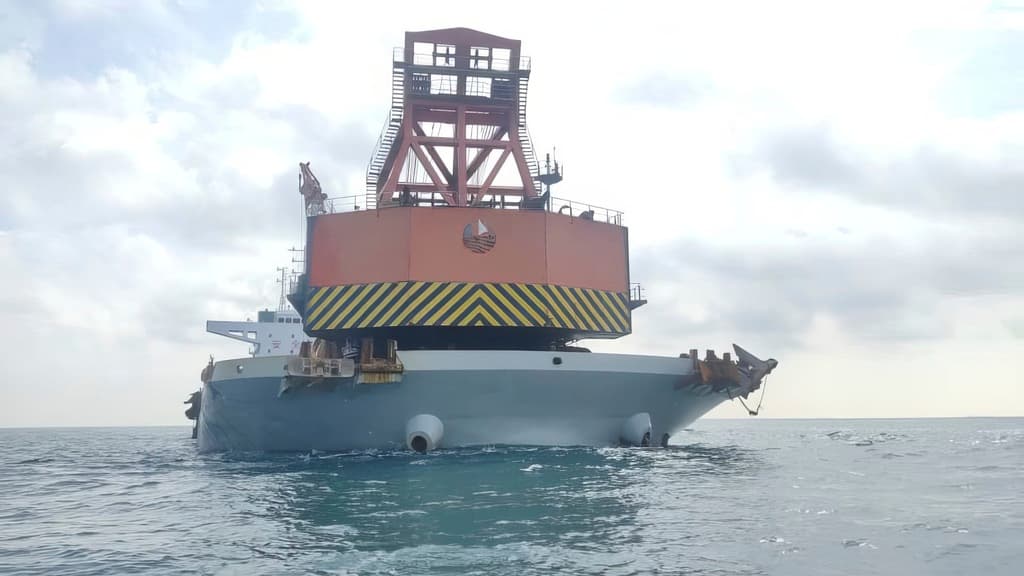Communist Chinese Scavengers Desecrating World War II Sea Graves
‘The world’s biggest grave robbery,’ the Guardian calls it, warning that ‘the unmarked graves of thousands of sailors are threatened.’

Warships containing the remains of World War II dead from America and its allies are falling under the greedy gaze of scavengers from Communist China, who desecrate these watery graveyards while tearing up the ships for scrap, a potential flashpoint in the trans-Pacific relationship.
A few days before Memorial Day in America, the Malaysian Maritime Enforcement Agency detained a barge, the Chuan Hong 68, registered in Fuzhou, China, which was found to be carrying shells looted from British wrecks in the South China Sea.
Local divers and fisherman, respecting the designation of the area as war graves, called authorities after spotting the “notorious” ship which, according to the New Straits Times, “was also responsible for looting 90 percent of other World War II shipwrecks in the region.”
The grab dredger had been feeding on two British battleships, HMS Prince of Wales and HMS Repulse, sunk by the Japanese after attacking Pearl Harbor, Hawaii, on December 7, 1941, costing the lives of 842 Royal Navy sailors and ensuring Britannia no longer ruled the waves in the Far East.
For ten years, the Hong and other dredgers have plundered the deep, stealing low-background radiation metal from the pre-nuclear age including steel, aluminum, copper, and bronze artifacts such as the bells of Repulse and Prince of Wales, which were recovered and are safe back in the U.K.
In a statement, the National Museum of the Royal Navy recalled the loss of Repulse and its sister ship to Japanese torpedoes as “one of the worst disasters in British naval history,” and quoted their prime minister, Winston Churchill, who wrote in his memoirs, “In all the war, I never received a more direct shock” than their loss.
Churchill wrote of tossing in bed when “the full horror of the news sank in upon me. There were no British or American ships in the Indian Ocean or the Pacific except the American survivors of Pearl Harbor, who were hastening back to California. Across this vast expanse of waters, Japan was supreme and we, everywhere, were weak and naked.”
Attention was first called to the problem of illegal salvage in 2016 when several vessels — including three Dutch and six British sunk during the Battle of the Java Sea — were found to have disappeared from the ocean floor along with America’s USS Perch, whose 59-man crew was captured, with all but five being starved to death in Japanese POW camps.
The Battle of the Java Sea cost the Dutch 900 sailors, but when the country sent an expedition to map the wrecks in preparation for the 75th commemoration of the loss, their defense ministry found nothing where HNLMS De Ruyter, HNLMS Java, and HNLMS Kortenaer had come to rest, and a “large hole” instead of HMS Encounter.
Japanese wrecks looted are often transports like the SS Montevideo Maru, whose final resting place was discovered in April, exposing its location to thieves. More than 1,000 Australian prisoner of war died in 1942 when the USS Sturgeon torpedoed the Maru.
Most of HMAS Perth, one of Australia’s most sacred sites, was found missing in 2017 — turrets, armor, plating, propellers, and propulsion machinery torn away. The ship went down in 1942 during the Battle of Sunda Strait, entombing 353 Australians.
In 2017, the Guardian called this scourge “the world’s biggest grave robbery, warning that “the unmarked graves of thousands of sailors are threatened by illegal metal salvagers,” and citing several desecrated Japanese craft “likely to still hold the remains of dozens of crewmen” and prisoners of war.
The Naval Historical and Heritage Command told U.S. Naval Institute News “sunken military craft should be respected,” adding that the Navy “works closely with the Department of State and host countries to ensure the preservation of sunken military craft abroad, which may also represent protected cultural heritage resources of those nations in whose waters they have come to rest.”
America and its allies go to great lengths to care for war graves on land. Those at sea deserve the same respect, and protection from the Hong and waterborne vultures like it that would cannibalize our honored dead in service of Beijing’s war machine.

